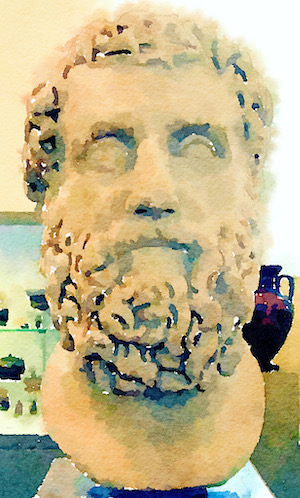
One of the earliest Greek poets whose works have survived, Archilochus of Paros (c. 680– c. 640 BCE), was born into a notable family who may have been priests in the cult of Demeter. His father, Telesicles, founded a Parian colony on Thasos, and Archilochus seems to have lived and worked there and his home town.
Apart from possible details gleaned from his poems, we know little about his life. Tatian, Proclus, Clement of Alexandria, Cicero, Aelian, Plutarch, Galen, Dio Chrysostom, Aelius Aristides and several anonymous authors in the Palatine Anthology provide snippets of biographical information. While the events he described may have been fictitious, ancient accounts tend to support the impressions from the poetry.
There is no evidence to support suggestions that his mother was a slave named Enipo or that he left Paros to escape poverty. While he is known to have been a soldier and reputedly died in a battle between Paros and Naxos, there is no evidence to suggest he was a mercenary. Life on Paros seems to have been reasonably prosperous. Though he frequently refers to a soldier's life and its fluctuating fortunes, there is no indication that he fought for money.
The surviving fragments of his work suggest he was an innovator in metre, language, and subject matter. As a master of the Greek language and the first European author to base his work on his own emotions and experiences, the ancients ranked him alongside Homer, Hesiod, Pindar, and Sophocles. However, there was also severe (and seemingly quite justified) criticism of his moral character,
Much of his subsequent renown rests on his sharp satire and vituperative insults. After a man named Lycambes reputedly betrothed his daughter Neobule to the poet and then reneged on the arrangement, he responded with a series of explicit poems. He dismissed Neobule as overblown and promiscuous, claims to have gently seduced her younger sister and describes the sexual experiences he and others enjoyed with the two of them. Lycambes and his daughters suicided.
Sources:
Chambers Biographical Dictionary
Alexander Eliot, Greece: A History
Encyclopedia Britannica
The Oxford Companion to Classical Civilization
The Oxford Companion to Classical Literature
Who's Who In the Classical World